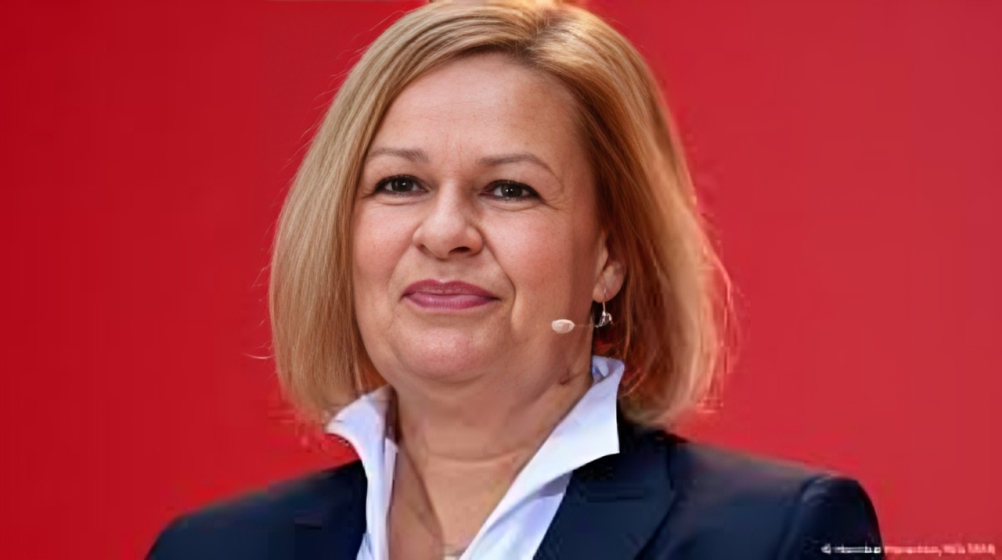Nancy Faeser is a name that has been making waves in Germany’s political landscape. As the current Minister of the Interior and Community, she stands at the forefront of pivotal issues facing the nation. With her dynamic approach to governance, Faeser embodies resilience and determination. Her journey is not just about personal achievement; it reflects broader themes of social justice, inclusion, and empowerment.
In this blog post, we will explore Nancy Faeser’s early life and education, delve into her political career, examine the challenges she faces as a female politician, highlight her contributions towards shaping Germany’s future, and discuss her advocacy for social justice. We’ll also look ahead to what goals she has set for herself moving forward while considering her impact on women in politics. Join us as we navigate through the inspiring story of Nancy Faeser!
Early Life and Education

Nancy Faeser was born on June 13, 1970, in Bad Soden am Taunus, Germany. Growing up in a vibrant environment fostered her curiosity and determination from a young age.
Her educational journey began at the University of Göttingen, where she pursued political science. This discipline ignited her passion for social issues and governance. She immersed herself in various student organizations that focused on advocacy and community service.
Faeser’s drive to understand complex societal structures propelled her into further studies at the prestigious University of Hamburg. Here, she deepened her knowledge while engaging with diverse perspectives.
These formative years laid the groundwork for Nancy’s future endeavors in politics. They shaped not only her beliefs but also equipped her with essential skills needed to navigate an ever-evolving landscape of public service.
Political Career
Nancy Faeser embarked on her political journey in local government, where her passion for community service began to shine. Her early involvement laid the groundwork for a future filled with significant roles.
She quickly moved up the ranks within the Social Democratic Party (SPD). There, she focused on issues affecting everyday citizens. Her dedication attracted attention and support from various quarters.
In 2021, Nancy was appointed Germany’s Federal Minister of the Interior. This marked a pivotal moment in her career. She took charge of critical areas such as immigration policy and public safety.
Her approach has been characterized by transparency and dialogue. By prioritizing cooperation over division, Nancy aims to foster unity across diverse communities in Germany. Each step she takes reflects her commitment to addressing contemporary challenges head-on while empowering those around her.
Challenges Faced as a Female Politician
Navigating the political landscape is never easy, but female politicians like Nancy Faeser face unique challenges. Gender biases can create hurdles that their male counterparts may not experience.
Media scrutiny tends to focus on appearance and personal life rather than policies or achievements. This often diverts attention from critical issues at hand.
Additionally, women in politics frequently encounter stereotypes that question their leadership skills. They must constantly prove themselves in a field still dominated by men.
Networking can also be daunting for women due to established cliques within party structures. Building genuine connections takes extra effort when faced with longstanding traditions of exclusivity.
Despite these obstacles, many female leaders use their experiences as catalysts for change, advocating for greater representation and equality within political spaces. Their resilience paves the way for future generations aiming to enter this arena.
Contributions and Achievements in Shaping the Future of Germany
Nancy Faeser has emerged as a key player in shaping modern Germany. Her contributions span various aspects of governance, from security to social policy.
As the Interior Minister, she championed reforms that enhance public safety while respecting civil liberties. This balance is vital for building trust within communities.
Faeser also prioritized digital transformation. She recognized the need for a robust cybersecurity framework, which positions Germany at the forefront of technological advancement in Europe.
Her focus on climate change and sustainable policies reflects her commitment to future generations. By promoting green initiatives, she aims to create a more resilient economy.
Moreover, her advocacy for inclusion has reshaped discussions around immigration and integration. By fostering dialogue among diverse groups, she encourages unity in an increasingly polarized society.
Each initiative contributes significantly toward crafting a progressive roadmap for Germany’s future.
Advocacy for Social Justice and Inclusion
Nancy Faeser stands out as a passionate advocate for social justice and inclusion in Germany. Her commitment to creating an equitable society is evident through her policies and public statements.
She focuses on marginalized communities, ensuring their voices are heard. This dedication fosters a sense of belonging among diverse groups within the nation.
Faeser’s initiatives aim to address systemic inequalities that have persisted over time. She champions equal rights, actively working to dismantle barriers faced by vulnerable populations.
Moreover, she emphasizes the importance of education in driving social change. By promoting awareness and understanding, Nancy seeks to cultivate empathy across different societal segments.
Her approach combines policy reforms with grassroots movements. This multifaceted strategy bolsters community engagement while encouraging collective responsibility towards inclusivity.
Future Goals and Plans
Nancy Faeser has ambitious plans for Germany’s future. Her vision centers on fostering an inclusive society where every voice is heard. She believes that diversity strengthens the nation.
One of her primary goals is to enhance digital infrastructure across the country. With a focus on technology, she aims to create opportunities that bridge gaps in education and employment.
Moreover, Nancy is dedicated to environmental sustainability. She understands that climate action cannot wait and advocates for policies promoting renewable energy sources.
Additionally, she emphasizes the importance of social cohesion. By addressing inequality and championing social justice initiatives, Nancy strives to ensure everyone benefits from Germany’s progress.
Her plans reflect a commitment not just to governance but also to empowering citizens at all levels. Through collaboration with various sectors, she hopes to implement strategies that resonate well into the future.
Impact on Women in Politics
Nancy Faeser’s rise in politics is a beacon for aspiring female leaders. Her journey demonstrates that women can excel in high-stakes environments traditionally dominated by men.
Faeser’s presence encourages young women to pursue roles in governance and public service. By breaking barriers, she showcases the power of diverse perspectives in shaping policies.
Her advocacy for gender equality amplifies voices often overshadowed. This commitment fosters an inclusive atmosphere where every opinion matters.
Moreover, her leadership style inspires collaboration rather than competition among women. It emphasizes support networks that empower rather than diminish one another’s achievements.
As more women look up to figures like Faeser, they find motivation to challenge norms and advocate for their rights within political spheres. Each step she takes paves the way toward a more equitable future for all genders in politics.
Conclusion
Nancy Faeser represents a significant force in German politics. Her journey from humble beginnings to becoming a prominent leader showcases her resilience and dedication. Facing challenges as a female politician, she has navigated the complex landscape with grace and determination.
Her contributions are not just limited to policy-making; they extend into shaping societal norms around social justice and inclusion. With every initiative, she aims to create a more equitable future for all Germans.
Faeser’s advocacy resonates deeply, especially among young women looking for role models in politics. As she continues her tenure, her plans reveal an ambition that goes beyond mere governance—she strives to inspire change at every level.
The impact of Nancy Faeser on women in politics cannot be understated. She embodies the possibility of success regardless of gender barriers, paving the way for future generations of leaders. Her story is still unfolding, promising exciting developments ahead for Germany and its political landscape.



